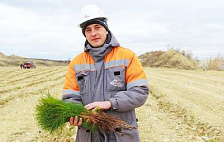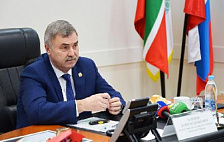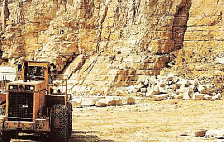Titan Cement International SA (Euronext Brussels, ATHEX and Euronext Paris, TITC) announced the nine month 2021 financial results.
-
Group revenue stronger by 5.0% to €1,262.8m or up by 10.1% in local currencies
-
Performance reflects continued strength of the US, a rebound in the Greek market, solid robust performance in Southeastern Europe and improving market in Egypt
-
Operating profitability (EBITDA) penalised, down by 4.3% to €219.6m in the period due to Q3 global spike in input costs; however, now on reducing trend
-
Net profit stronger by €23.9m or 41.4% to €81.9m benefiting from significantly lower finance costs
-
Commitment to SBTi’s “Business Ambition for 1.5°C” and partnership with the “Race to Zero” campaign of the UNFCCC
-
The production of lower carbon Type IL cement in Titan America has now reached 50% of its total cement output
Overview of the nine months 2021
In the first nine months of 2021, all of TITAN Group’s markets recorded solid volume growth which translated into increased revenue for the Group. Performance was supported by continued strength in the US, an encouraging recovery and pick-up of construction activity in Greece and a solid delivery in Southeastern Europe. Egypt confirmed indications earlier in the year that with the rationalization of production imposed, operational performance can start to recover its lost momentum. Clouds have been gathering over Turkey owing to the country’s macroeconomic challenges while Brazil continued to grow.
As a result, Group consolidated Revenue for the first nine months of 2021 reached €1,262.8m posting a 5.0% increase. Revenue growth in local currencies was 10,1%. Witnessing the global input cost inflation hitting many industries, the building materials sector had a more visible impact during the third quarter of the year, with energy and freight costs reaching a peak in Q3. The reversal of this trend started in October and current prices indicate that the Group should expect a more favorable cost environment going forward. Owing to the unprecedented spike in costs and the inevitable time-lag in mitigating pricing actions, EBITDA came under pressure to €219.6m posting a 4.3% decline.
The Group nine-month 2021 net result after taxes and minority interests rose to a profit of €81.9m compared to a profit of €58.0m in the same period of 2020, higher by 41.4%, being largely the result of the Group’s lower leverage and successful refinancing strategy.
Regional review of the nine month of 2021
USA
In the nine months to 30th September, trends confirm the dynamic recorded so far in the year and the prospects for further growth ahead. Titan America is the largest producer of Type 1L (low carbon Cement) sold in the US. The well documented by now spike in all categories of input costs (mainly energy, logistics and labor cost) has been reflected in profitability margins which have come under pressure as a result, particularly in the third quarter of the year. The Group took action to recoup costs through a second price increase in late summer but considering contracts already in place and the magnitude of the spike in costs, the effect of those mitigating actions will inevitably manifest itself with a time-lag. A new round of price increases was announced applicable on January 1st aiming to recover the margin lost due to cost inflation.
Revenue in the USA recorded an 8.7% increase in US $ terms in the first nine months of 2021, translated into a corresponding increase of 2.1% in Euro terms to €731.3m. EBITDA softened to €126.7m, (5.1% decline in US $) 10.6% below the first nine months of 2020 in Euro-terms.
Greece & Western Europe
The market continued its encouraging performance in Greece, lending further support to the belief that it is now in a steady long-term growth path. Sales volumes increased in both the last quarter and the nine months. All construction segments are providing an impetus to demand. Against this market backdrop, price increases have also been realized, still not sufficient enough to cover the surge in electricity, fuel and freight costs which was recorded particularly in the third quarter of the year. Group exports continued apace in response to the upsurge in global demand across markets served by the Group’s network.
Total revenue for the region of Greece and Western Europe in the first nine months of 2021 grew by 10.3% to €194.5m while EBITDA came in at €20.4m versus €16.2m in the first nine months of 2020.
Southeastern Europe
The Group’s markets in Southeastern Europe continued delivering a strong performance following a strong first half of 2021. Volumes and prices developed well across the region reflecting both solid infrastructure and residential housing trends, depending on the particularities of each market. Rising energy costs however, both in terms of electricity and fuel, continue to penalize the performance of the region with the Group playing catch up in terms of price increases to mitigate the inflationary effects. Higher levels of utilization at the Group’s cement plants across the region continued to testify to the region’s satisfactory overall performance, while there is still ample production potential to meet stronger levels of demand in the future.
Revenue for the region overall increased by 9.2% to €214.6m while EBITDA declined by 5.2% to €69m in the first nine months of 2021.
Eastern Mediterranean
In Egypt, the market continues to exhibit positive signs growing at c.7% year-to-date. The Group’s plants have been operating at the levels of the production cap applied across the market while prices have also consistently maintained their upward trend. As a result, operational profitability in the country is improving after many years of unsatisfactory performance. The market is largely driven by public investment which includes a sizeable proportion of public housing and recently a rehabilitation of the country’s port infrastructure.
In Turkey, inflationary pressures on the input cost side -mainly fuel- are further exacerbated by the weakening local currency. Overall, the domestic market is exhibiting softness while high freight rates are also reducing the attractiveness of exports. Although prices remained elevated in both the quarter and the nine months, they only partly set-off cost inflation.
Total revenue in the Eastern Mediterranean reached €122.4m, posting an increase of 8.1% year on year, while EBITDA jumped to €3.5m versus a €1.1m loss in the first nine months of 2020, returning the region’s profitability to positive territory.
Brazil (Joint venture)
The market in Brazil continued to grow, posting a 9.4% increase in volumes versus the first nine months of 2020, supported by both residential and commercial sectors projects in the region. Our joint venture Apodi posted an increase in revenue to €60.6m (vs €50.5m in the first nine months of 2020) as well as in EBITDA to €14.4m vs €11.7m in 2020.
ESG Performance
In October, TITAN Cement Group signed the “Business Ambition for 1.5°C”1 Commitment letter committing to keeping global warming to 1.5°C and reaching net-zero emissions by 2050. TITANs decarbonization targets were validated by the Science Based Targets initiative (SBTi).
The Group further reduced the carbon footprint of its products by shifting to lower carbon cements in Egypt and Greece, and began to export lower carbon Portland limestone cement (Type IL), from Greece to the US. Moreover, the production of Type IL cement in Titan America has now reached 50% of its total cement output. Titan America’s plant Pennsuco in Medley, FL is today the largest U.S. producer of Type IL cement, which has approximately 15% lower carbon emissions than Type I or Type II cement. The Group has also been making progress in energy efficiency, with 86.8% of its total clinker production now covered by ISO50001 certification or energy audits.
TITAN is exploring further optimization of the cement kiln’s combustion efficiency by hydrogen enrichment with two industrial scale pilot tests in Greece and Bulgaria. Moreover, the national authorities in Greece have included the Group’s project H2CEM, which involves the production and use of green hydrogen for manufacturing cement clinker in industrial kilns, in the pre-notification stage of the first wave of important projects of common European interest (EU Hydrogen IPCEI).
Financing and Investments
Group operating free cash flow reached €68m, a decrease of €60m compared to the nine months of 2020 due to a seasonal increase of working capital and higher Capital expenditure that was increased by 50% to €90m, up by €29m compared to the Covid restrained investment program of 2020.
Following increased Capex, higher capital needs and payment to IFC of the last instalment of €41m, Group net debt at the end of September 2021 was €735m, lower by €31m compared to a year earlier.
Share buy-back: The Board decided to implement a share buy-back program of up to a maximum amount of EUR 10,000,000 in Euronext Brussels and the Athens Exchange. The expected term of the program is 6 months and its implementation started on October 14, 2021.
Financial Results of the third quarter of 2021
In the third quarter of 2021, Group Revenue increased by 6.2% compared to last year reaching €441.7m testifying the continued strong demand momentum across most of our markets. Group Revenue was up by 7.1% in local currency terms. Group EBITDA declined by 16.8% to €77m, reflecting the sharp rise in energy, electricity and freight costs. Third quarter 2021 net result after taxes and minority interests was a profit of €24.0m compared to a profit of €35.5m in the same period of 2020, lower by 32.5%.








